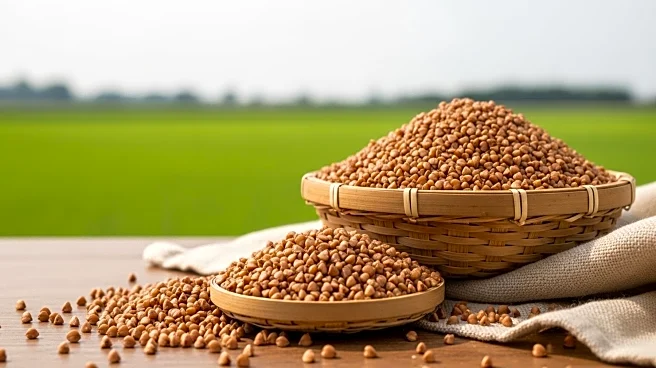What is the story about?
What's Happening?
Buckwheat, a resilient and versatile crop, is gaining attention in the United States as a potential solution for transforming school food programs. Despite being generally overlooked, buckwheat is recognized for its ability to grow quickly and thrive in less-than-perfect soil conditions, making it a 'climate-solution crop.' Washington State University researchers, supported by a $350,000 grant from the U.S. Department of Agriculture, have collaborated with local farmers to develop a buckwheat pancake mix. This mix has been tested in nearly 300 school districts, with positive feedback leading to a formulation that includes 50% buckwheat. The initiative aims to promote buckwheat's nutritional benefits and its potential to improve soil health for subsequent crops. Additionally, the USDA grant supports the Buckwheat Festival in Burlington, which educates the public on the crop's diverse uses, including plant-based milk alternatives and baked goods.
Why It's Important?
The promotion of buckwheat in school food programs represents a significant shift towards more sustainable and nutritious food options. Buckwheat's resilience to climate change and its ability to improve soil health make it an attractive crop for future agricultural practices. By incorporating buckwheat into school meals, educational institutions can provide healthier food choices while supporting local agriculture. This initiative also highlights the importance of diversifying crops to reduce reliance on climate-sensitive plants, potentially leading to a more stable food supply. Furthermore, buckwheat's appeal to pollinators like bees underscores its ecological benefits, contributing to biodiversity and ecosystem health.
What's Next?
The continued development and promotion of buckwheat-based products are expected to expand its presence in American agriculture. Researchers and farmers are advocating for buckwheat to become a year-round crop, embraced nationwide. Future efforts may focus on increasing consumer awareness and acceptance of buckwheat, potentially leading to broader adoption in various food products beyond school programs. The success of initiatives like the Buckwheat Festival could further drive interest and investment in buckwheat cultivation, supporting sustainable farming practices and contributing to environmental conservation.
Beyond the Headlines
Buckwheat's rise in popularity could have long-term implications for the agricultural industry, including reduced waste and pollution. As a crop that requires minimal water and weed control, buckwheat offers an environmentally friendly alternative to traditional grains. Its potential to replace more climate-sensitive crops could lead to a cooler, cleaner future, aligning with global efforts to combat climate change. Additionally, the focus on buckwheat may inspire similar initiatives for other underutilized crops, fostering innovation and sustainability in food production.
















